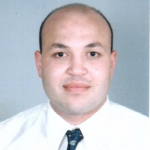- This topic has 7 replies, 2 voices, and was last updated 7 years, 10 months ago by
 Debanjan Sarkar.
Debanjan Sarkar.
-
AuthorPosts
-
-
April 18, 2018 at 6:30 am #48575
 Debanjan SarkarParticipant
Debanjan SarkarParticipantI am trying to implement one FSO model having the specification :
Scintillation model: Gamma-Gamma
Frequency: 1550nmAlso, consider three conditions:
1) weak turbulence, refractive index= 5 X 10^(-17) m^(-2/3)
2) moderate turbulence, refractive index = 5 X 10^(-15) m^(-2/3)
3) strong turbulence, refractive index = 5 X 10^(-13) m^(-2/3)under each turbulence, I have considered some weather conditions such as very clear, clear, haze, fog etc.
First I have considered the weak turbulence, and draw the link range v/s received power curve for all the weather conditions. (Fig1)
But when I tried to draw the same curve in moderate and strong turbulence the link range v/s received power curve is in a zigzag form.(Fig2)
please help regarding this.
Thank you -
April 18, 2018 at 9:55 am #48581
 Mohamed A. A. AbouseifParticipant
Mohamed A. A. AbouseifParticipantthis behaviour might be some interference in the medium.
if you can upload the project to try to help.thanks
Mohamed Abouseif -
April 19, 2018 at 12:20 am #48583
 Debanjan SarkarParticipant
Debanjan SarkarParticipantThank you. I have attached one .osd file please check. In this setup also same problem.
-
April 19, 2018 at 12:32 am #48584
 Debanjan SarkarParticipant
Debanjan SarkarParticipantatatched file
-
April 19, 2018 at 12:34 am #48585
 Debanjan SarkarParticipant
Debanjan SarkarParticipantattached file
-
April 19, 2018 at 10:00 am #48591
 Mohamed A. A. AbouseifParticipant
Mohamed A. A. AbouseifParticipantHi Debanjan,
I went through your project.
please notice that the parameter you changes is not the refractive index it is the “INDEX REFRACTION STRUCTURE”
the physical meaning of this parameter is related the VARIATION of the refractive index of the free space due to climate change (dust, rain, solar cells …etc) these change in the refractive index act like a series of lens that causes a fluctuation of the received power with distance especially at longer range (like what you have 10-15 km!!). you can understand that more, if you repeat the simulation many times, you would find different power fluctuations, as expected!!.Hope that is clear now and beneficial.
Also, attached paper is a very useful and fundamental paper that you can read to widen your knowledge about FSO.hope that helps,
best regards
Mohamed Abouseif -
April 19, 2018 at 10:18 am #48594
 Debanjan SarkarParticipant
Debanjan SarkarParticipantThank you Mr.Abouself
I will study the paper. But in one paper i have found
weak turbulence, refraction index stucture= 5 X 10^(-17) m^(-2/3)
moderate turbulence, refraction index stucture= 5 X 10^(-15) m^(-2/3)
strong turbulence, refraction index stucture = 5 X 10^(-13) m^(-2/3)
i am confused how to calculate ber curve and/or link range vs received power curver for these three turbulence conditions. If you know regarding this please suggest.
Thank you -
April 19, 2018 at 11:00 am #48597
 Debanjan SarkarParticipant
Debanjan SarkarParticipantI have draw the linkrange vs received power by varing link range from 1 to 5 km..in weak turbulence…but when i tried to draw the same curve within the same range for both modarate and strong turbulence it gives the curve as attached earlier..i am unable to understand why this is happening??
Thank you
-
-
AuthorPosts
- You must be logged in to reply to this topic.

